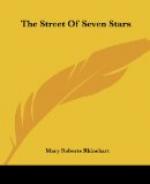From the Portier’s bed was coming a rhythmic respiration!
She roused him, standing over him with the iron candlestick, now lighted, and gazing at him with eyes in which alarm struggled with suspicion.
“Thou hast been out of thy bed!”
“But no!”
“An hour since the bed was empty.”
“Thou dreamest.”
“The chain is off the door.”
“Let it remain so and sleep. What have we to steal or the Americans above? Sleep and keep peace.”
He yawned and was instantly asleep again. The Portier’s wife crawled into her bed and warmed her aching feet under the crimson feather comfort. But her soul was shaken.
The Devil had been known to come at night and take innocent ones out to do his evil. The innocent ones knew it not, but it might be told by the soles of the feet, which were always soiled.
At dawn the Portier’s wife cautiously uncovered the soles of her sleeping lord’s feet, and fell back gasping. They were quite black, as of one who had tramped in garden mould.
Early the next morning Harmony, after a restless night, opened the door from the salon of Maria Theresa into the hall and set out a pitcher for the milk.
On the floor, just outside, lay the antlers from the deer across the street. Tied to them was a bit of paper, and on it was written the one word, “Still!”
CHAPTER X
In looking back after a catastrophe it is easy to trace the steps by which the inevitable advanced. Destiny marches, not by great leaps but with a thousand small and painful steps, and here and there it leaves its mark, a footprint on a naked soul. We trace a life by its scars, as a tree by its rings.
Anna Gates was not the best possible companion for Harmony, and this with every allowance for her real kindliness, her genuine affection for the girl. Life had destroyed her illusions, and it was of illusions that Harmony’s veil had been woven. To Anna Gates, worn with a thousand sleepless nights, a thousand thankless days, withered before her time with the struggling routine of medical practice, sapped with endless calls for sympathy and aid, existence ceased to be spiritual and became physiological.
Life and birth and death had lost their mysteries. The veil was rent.
To fit this existence of hers she had built herself a curious creed, a philosophy of individualism, from behind which she flung strange bombshells of theories, shafts of distorted moralities, personal liberties, irresponsibilities, a supreme scorn for modern law and the prophets. Nature, she claimed, was her law and her prophet.
In her hard-working, virginal life her theories had wrought no mischief. Temptation had been lacking to exploit them, and even in the event of the opportunity it was doubtful whether she would have had the strength of her convictions. Men love theories, but seldom have the courage of them, and Anna Gates was largely masculine. Women, being literal, are apt to absorb dangerous doctrine and put it to the test. When it is false doctrine they discover it too late.




